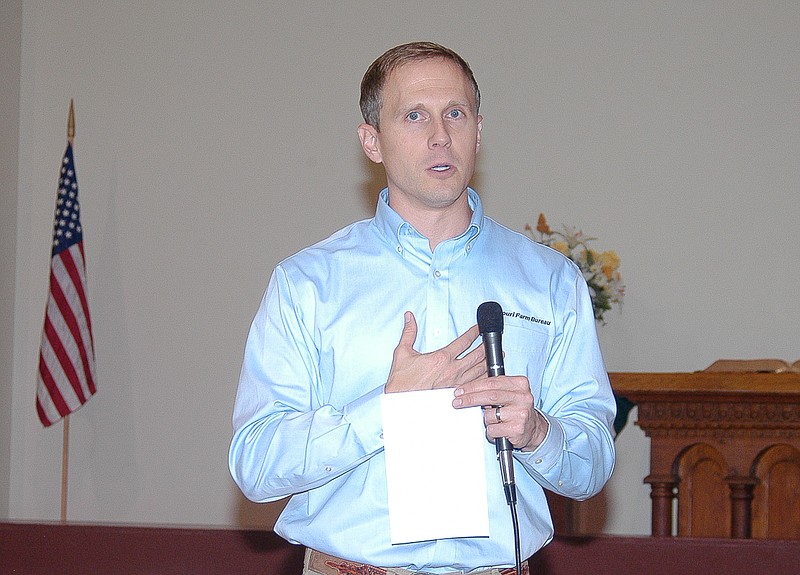Moniteau County Farm Bureau members gathered Tuesday, Oct. 20, for the annual dinner meeting held at the California United Church of Christ fellowship hall. This is the 100th anniversary of the Farm Bureau.
The elementary vocal students, "California Kids," performed "I Got a Feelin," "Count on Me," "Stand By Me," and "American Finale" - a medley of "America the Beautiful" and "God Bless the USA."
The event was called to order by President Dennis Feezor, who led the Pledge of Allegiance and called on Lashley Rohrbach to deliver the Invocation
The topic of the Waters of the U.S. (WOTUS) rule of the EPA was laid out by guest speaker Garrett Hawkins, Farm Bureau Director of Legislative Programs. This "land use" issue is generally considered by landowners to be a land grab attempt by the EPA, in its effort to expand the meaning of "Navigable Waters of the U.S."
According to Hawkins, Missourians and Missouri farmers have legitimate concerns about the rule, which could bring any wet spot on a piece of property under the rule.
Currently 3,869,667 (7 percent) of the acres in Missouri falls under the EPA jurisdiction as "Waters of the U.S." rules as being within a 100-foot buffer of anything considered navigable waters. Making the buffer area 1,500 feet would bring 41,172,874 acres (92 percent) of the state under EPA jurisdiction and ultimate control. Expanding the buffer area to 4,000 feet would bring the jurisdiction and ultimate control of all activities to 44,459,122 acres (97 percent) of the EPA.
Missouri is one of 13 states which has joined in a suit by South Dakota. Currently, a Circuit Court temporary stay is in place to prevent this expansion of what has been described as a "massive land grab" by an arm of the federal government.
"If you can control a wet spot," Hawkins said, "you can control what goes on around it."
He said that if and when this "ramps up" to the maximum control, anyone will be able to sue their neighbor for anything they might not like about what is going on next door.
At this point, Hawkins said there is no certainty about what is in or out of the EPA's jurisdiction and control. He recommended contacting the elected federal officials and insisting that the U.S. Congress do its job of protecting the rights of the landowners.
He recommended going to fb.org/issues/wotus/resources/ to learn more about Farm Bureau's WOTUS analysis for Missouri. It was mentioned that the public school in Bozeman, Mont., School Board voted on July 13, to suspend the National School Lunch Program (NSLP) at the high school level. Originally to provide stable funding for nutritious foods which promote student health, the program established minimum nutrient requirements.
With the heavier weight trending among young people in the last 30 years, the 2010 Healthy Hunger-Free Kids Act was instituted for the lunch and breakfast programs. The school district is reported to have found lower participation, and fewer meals sold, causing a loss of about $16,000 from the program, despite $117,000 in federal subsidies. The report was that the district has contracted with local food producers and the cooks are now cooking from scratch, which has increased participation.
The 2014 Minutes and the Treasurer's report for the fiscal year ending June 30, were approved. Feezor, Chuck Massengill, Lisa Porter and Barry Eschenbrenner were elected to remain on the board. Other members are Gary Reichel, Sandi Knipp, Kenny Jones, Andy Clay and Lashley Rohrbach.

